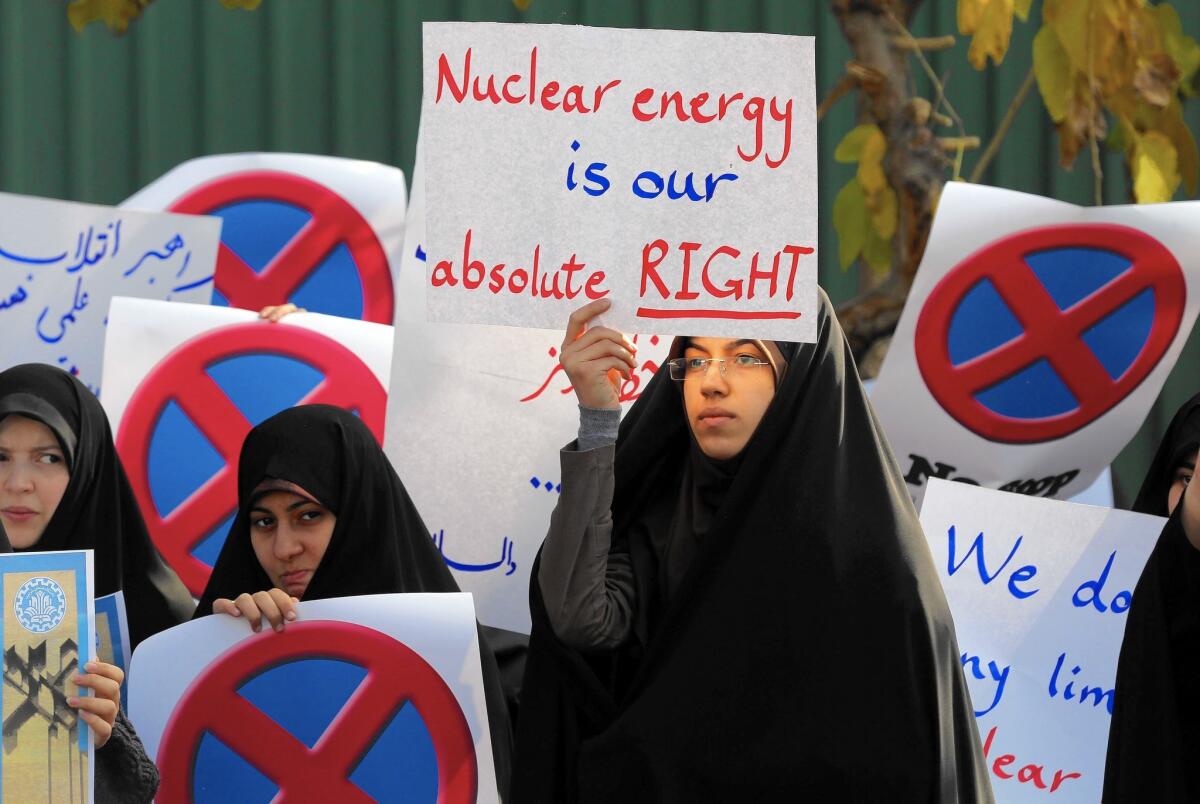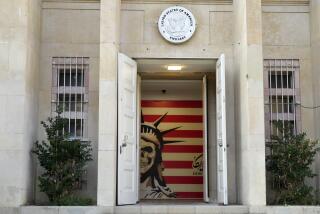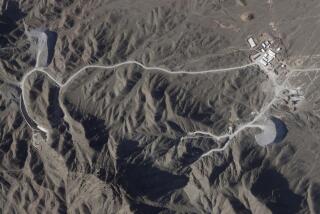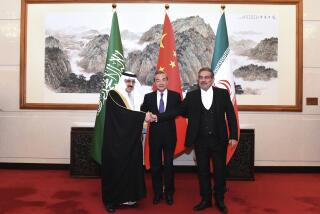Protesters in Iran warn nuclear negotiators against caving in to West

The demonstrators gathered Sunday just outside the gates of a research nuclear reactor named after one of Iran’s roster of assassinated atomic scientists. The protesters had a pointed message — more like a warning — for President Hassan Rouhani and his negotiating team in Vienna.
“If you sign and seal a colonial-era deal ... it will be a disgrace for you,” declared one speaker, Ali Khalili, 32, who likened the prospect of a deal to scale back Iran’s nuclear ambitions to the infamous loss of national territory to the Russian empire during the 19th century reign of Persia’s much-despised Qajar dynasty.
On Iran’s home front, the rhetoric is reaching fever pitch as negotiators meet in the Austrian capital to try to conclude an eleventh-hour nuclear deal between Iran and six world powers, including the United States. But one side in the heated debate here has the upper hand, at least publicly.
Skeptics of the deal were out in the streets Sunday. The opinions of supporters are buried in websites, reformist newspapers and private conversations.
Prospects appear dim for a final, comprehensive accord by Monday’s deadline. Speculation has focused on a possible extension to allow continued negotiations on fiercely contested points, namely Iran’s uranium enrichment levels and a timetable for lifting economic sanctions against the Islamic Republic.
But many conservative Iranians, wary of what they call a sellout to the West, are making sure that their voices are heard. Protesters say they fear that Iranian negotiators are poised to cave in to Western demands that would severely restrict the country’s nuclear program and phase out sanctions only gradually, providing little initial relief to ordinary Iranians.
“This is a double standard imposed on us by America,” said Ali Shafiei, 26, a computer software student who was among the 200 or gathered outside the nuclear plant.
The small demonstration was the latest in a series of officially sanctioned gatherings of activists who regard the talks as part of a broader U.S. and Israeli scheme to weaken Iran, destabilize the government and reverse the course of the 1979 Islamic Revolution.
By contrast, there have been no public manifestations of ordinary Iranians favoring a nuclear deal. Although the negotiations are backed by the highest echelons of Iran’s government, support for them would paradoxically be viewed as seditious, observers say.
For Iran’s leadership, observers say, allowing anti-deal public events serves a significant purpose: reassuring core supporters that the revolution will not be undermined, even as talks with the West proceed. The public displays of doubt also provide cover should the talks collapse.
With no accurate polling, it is impossible to say what percentage of Iranians favor a nuclear accord that would help lift sanctions that have contributed to the crippling of Iran’s economy. Yet conversations and anecdotal evidence plainly suggest that many Iranians, especially well-educated urban residents, support some kind of agreement.
“Any deal that can help us get rid of the sanctions is OK by us,” said Sohail, 27, a tech engineer who asked that his last name not be used for privacy reasons, adding that many of his friends shared his thinking. “But we don’t dare to go into the streets saying we want a deal to have better jobs and improved standards of living. We would be accused of being corrupted, pro-U.S.A. and pro-West and of being traitors.”
The broad appeal of Rouhani’s vow to end sanctions and Iran’s international isolation were key factors in his sweeping victory in last year’s presidential election against a number of hard-line opponents. Rouhani polled especially well in cities and among professionals. But skeptics of a nuclear deal, even if they are in the minority, cast a much bigger shadow in Iran.
“You see anti-deal protesters, but not marches by those who would support an agreement,” noted Mahmood Askarieh, who manages a new, English-language news website, Iran Front Page. “However, this is not to deny that there are many who support a deal, perhaps a majority, especially in the cities. But they must remain a kind of silent majority.”
That is the case despite the fact that the talks are taking place with the full backing of Iran’s supreme leader, Ayatollah Ali Khamenei, whose authority is publicly unquestioned, even among Iran’s most conservative blocs. He has expressed considerable skepticism that negotiators will be able to reach an equitable accord, saying he does not trust the United States.
Ritual shouts of “Death to America!” and “Death to Israel!” punctuated Sunday’s protest, which began with the chanting of Koranic verses.
Participants bared placards declaring, in English, “Sanctions must be removed,” insisting especially on the lifting of international penalties limiting Iranian oil sales and access to banks, the most damaging aspects of the sanctions regime.
Demonstrators tended to view Iran’s president as a potential appeaser of the West, perhaps an unwitting one, despite the considerable experience and revolutionary pedigree of Rouhani, a Shiite Muslim cleric and former chief nuclear negotiator.
Many reserved special scorn for Rouhani’s chief nuclear negotiator, Foreign Minister Mohammad Javad Zarif, whom some hard-liners have demonized as a Western lackey. Conservatives are extremely leery of Iran’s top diplomat, whose fluent English and easy smiles have won admirers in the West. At Sunday’s protest, participants dismissed Zarif’s status as a hero to Iranian reformers.
“Zarif must be impeached in the Iranian parliament if he seals the deal tomorrow!” shouted one woman in a yellow dress who declined to give her name for privacy reasons. “I am 45 years old and all the old regimes in Iran have sold out our national interests. I do not want to witness another sell-out.”
The demonstration, like other forums critical of the nuclear talks, clearly had an official imprimatur. Iran’s hard-line factions exert control over many aspects of Iranian life, especially security matters.
The protest took place outside the grounds of the Tehran Research Reactor, which, among other things, manufactures medical isotopes for use in cancer treatment. Ironically, the plant was initially set up by the United States in pre-revolutionary days, when Washington was a close ally of the monarchy.
The site has been renamed after Majid Shahriari, one of a number of nuclear scientists killed in targeted assassinations that Tehran blames on Israel and its Western allies. Some protesters wore white in memory of the slain scientists, who are regarded as martyrs.
The plant is heavily guarded and under the strict gaze of Revolutionary Guard and other security personnel, with signs warning against photography. It is inconceivable, observers say, that such a protest could have taken place without official encouragement. TV cameras were present.
As Sunday’s protest neared its end, a speaker grabbed a megaphone and declared: “President Rouhani takes his advice from Iranian diplomats and scholars who do not believe in independence and sovereignty!”
Many in the crowd clearly agreed. Should a deal be struck Monday, they vowed to be back immediately on the streets in vocal protest, certain that its terms would be a betrayal.
Special correspondent Mostaghim reported from Tehran and Times staff writer McDonnell from Beirut.
Follow @mdcneville for news from Iraq and Syria
More to Read
Start your day right
Sign up for Essential California for news, features and recommendations from the L.A. Times and beyond in your inbox six days a week.
You may occasionally receive promotional content from the Los Angeles Times.






